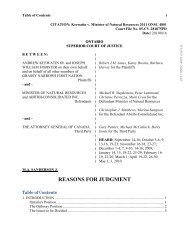Cronk v. Canadian General Insurance Co., 1995 CanLII 814 (ON CA)
Cronk v. Canadian General Insurance Co., 1995 CanLII 814 (ON CA)
Cronk v. Canadian General Insurance Co., 1995 CanLII 814 (ON CA)
You also want an ePaper? Increase the reach of your titles
YUMPU automatically turns print PDFs into web optimized ePapers that Google loves.
employees can never be entitled to the same notice period as a management<br />
employee of the same age and years of service.<br />
There will be few employees at any level who have the long- standing service of<br />
Ms <strong>Cronk</strong>. Indeed, such long service may increasingly by considered an historical<br />
relic: see Kilcoyne, in "Risks, Rights and Reificaction", supra, at pp. 345-346. It<br />
may be that in cases of exceptionally long service the weight to be given to<br />
character of employment should not be the dominant factor in determining<br />
reasonable notice because the employee, whether clerical or management, may be<br />
unable to find another job. The employee with long service has few remaining<br />
years in which to retrain, fewer years in the workforce to offer another employer,<br />
and, depending on the pension plan of the employer, the contribution the employer<br />
would be required to make for the newly hired employee in comparison to a<br />
younger employee with the same skills would be higher. Long-term service was<br />
said by McEachern C.J.S.C. in Ansari , supra, at p. 39, to be a moral claim that<br />
matures into a legal entitlement. In cases of long services it may be that more<br />
weight should be given to the length of service that the employee has given to the<br />
employer than to character of employment.<br />
In summary, the approach articulated in Bardal constitutes the appropriate legal<br />
standard to be applied by a court. The factors articulated by McRuer C.J.H.C. are<br />
the considerations to be applied in determining the amount of reasonable notice.<br />
The application of these factors does not require that a clerical employee<br />
automatically be placed in a category that has a lower range of notice than<br />
executive employees. To do so is to take one factor, the employee's character of<br />
employment, and to place undue emphasis on it. The application of a legal<br />
standard requires a much more flexible approach.<br />
Within the application of the standard, the weight to be given to character of<br />
employment is not solely a legal question. It requires the determination of a factual<br />
question. The question is: To what extent does an employee's position in the<br />
hierarchy of a company have any correlation to his or her ability to obtain<br />
alternative employment? At least in the case of the long-serving older employee,<br />
the factual proposition supporting the view that clerical workers are in a better<br />
position to find employment may no longer be valid. If the prospects of reemployment<br />
for both the clerical employee and the management executive are<br />
generally equally bleak when they are 55 and have given long years of service to<br />
the same employer, then, in the absence of any other valid reason for doing so, we<br />
ought not to weigh them differently.<br />
Without the benefit of evidence and argument thereon, I am of the opinion that<br />
this court is not in a position to decide the question of the weight to be given to the<br />
character of employment in this case. I am of the view that there is a genuine issue<br />
for trial.
















